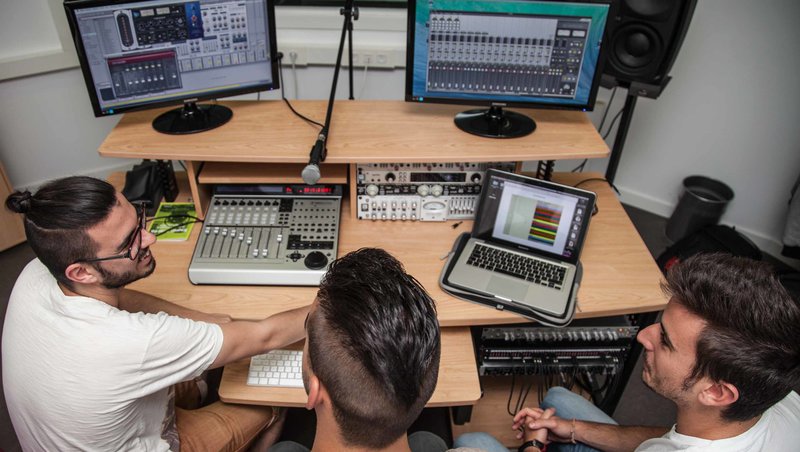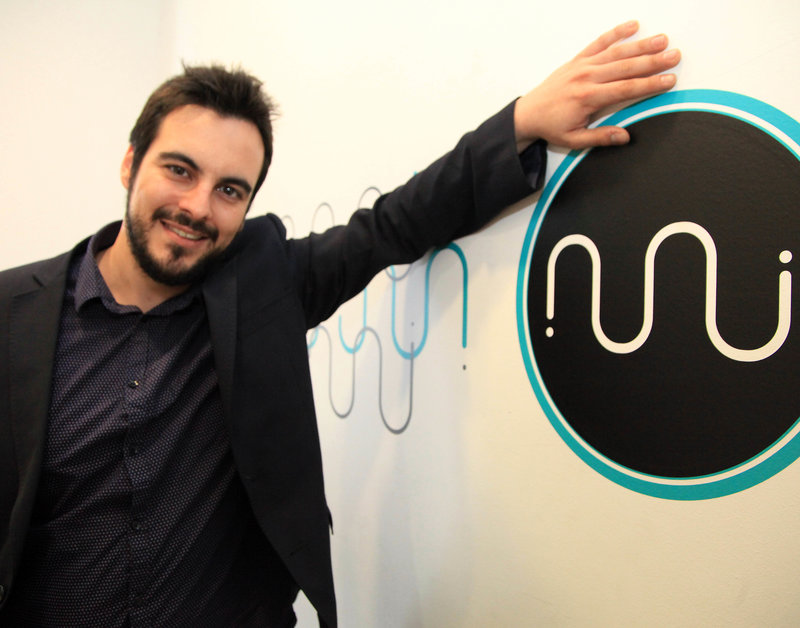Advanced music is a trend on a world level we need to follow
It's the concept of total art or total artist what we aim for
When and how was Eumes born?
10 years ago when I was teaching at Eram (Escola de Realització Audiovisual i Multimèdia ) in Salt, my students asked me where they could study more of my subjects: sound, music and new technologies. But there was no such degree in our country. In the UK and US, studies of the kind already existed, so we were a bit behind the time here. Then in 2012, we sat down with people who had the same idea of creating an advanced music school – artists, sound technicians, specialists in economics, communication, promotion – and we decided to make this a reality. We focused on two schools: Pontblank in London and Dubspot in New York. Now we are working with Dubspot, an impossible dream only a few years ago.
What is your background?
I started studying IT, but my passion was art, so I used technology to express my artistic ideas. I then started studying in Eram, later I become a teacher there and started teaching sound, music and soundtrack composing. I combined teaching with composing until we set up Eumes, the advanced music school, which I am running at the moment.
What is advanced music? Is it just another term for electronic music?
Advanced music is a new concept which involves classical, modern (jazz, rock) and electronic music. In many soundtracks you hear, you may think it's a whole philharmonic orchestra playing but it's just a computer, and it's the new technologies that allow you to create something really big without any instruments at all. So for us advanced music includes all the techniques that are nowadays possible, but mixed with all the culture, classical, modern and electronic music altogether. It is a trend on a world level and we need to follow that. We haven't invented anything new, just had a look around to see what was going on out there and then brought it here, because we also need it.
Which is the philosophy of the school?
Our philosophy is to make each student the best version of him or herself. Each musician is different so we try to give them the perfect mix of tools and artistic concepts to create their own style. The philosophy is to mix technology, art, and personalised training, which are the three pillars of each academic year in Eumes. If you mix these three things, then you have a brand new school called Eumes.
What careers can students do after studying here?
Many came here as DJs but things are changing. DJs were like rock stars 10 years ago, but nowadays everyone can be a DJ. The total artist of tomorrow will be the one who can be a DJ, knows classical music, plays the keyboard or maybe the violin, but also knows technology and has a good concept of how to explain his or her art, who knows the internet and how to use it. This is the trend: being a global artist, which involves knowing a lot of technology and art and being connected to the world today. It's the concept of total art or total artist what we aim for, not being specialised in just one thing. A complete musician should create and promote himself at the same time. At a conference in Barcelona with Indy Saha from Google, he said that 60% of the jobs we know today won't exist in 10 years' time, when we'll have totally new jobs. It is exciting because we are creating new careers, the musicians of tomorrow.
What about projects?
This summer I'll do some workshops for Sónar with Dan Freeman, the director of Dubspot in New York. We are also working on an exchange programme with Northampton University so that different teachers come here to teach in English. If you learn two languages your brain has a synapsis which connects music with concepts – mnemotechnics. We'll create a new melody-connected study, which will link the most important languages in the world: English and music. Another project is a collaboration with Gestmusic Endemol. We want to offer students the real possibility to practise in one of the best companies in the field of music and sound.
What about the teaching staff?
We're lucky to have a great team with Albert Moner, composer and guitarist, Luka Caro, one of the biggest promoters in Catalonia, Oriol Rossell and Javier Blánquez, music journalists, Toni París, one of the best known recorders, from the 44.1 studios in Aiguaviva, and Eduard Pérez, DJ teacher. Also, I teach music production and I'm specialised in Abelton Live, a programme that changed composing music.




